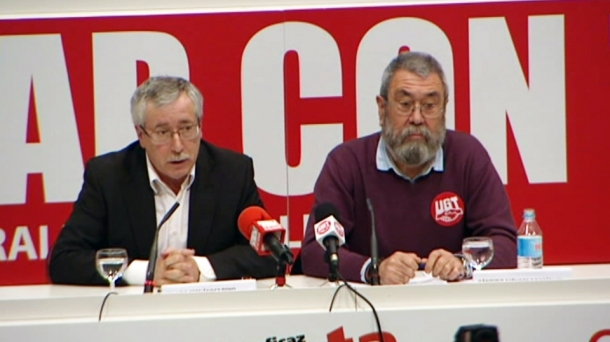news
Economic crisis
Spanish unions call March 29 general strike to protest labour reform
Reuters
Madrid
Spanish unions failed to reach a compromise with the government on a labour reform which makes it cheaper to fire workers and more difficult to implement inflation-linked salary hikes.
-
CCOO and UGT leaders. Photo: EFE
Spanish unions voted for a March 29 general strike on Friday after failing to reach a compromise with the government on a labour reform which makes it cheaper to fire workers and more difficult to implement inflation-linked salary hikes.
The reform is part of the centre-right government's measures to breathe life back into an economy that is probably already in recession and to encourage hiring in a country with an unemployment rate of 23 percent.
Spain's borrowing costs have risen above those of Italy in recent weeks after Prime Minister Mariano Rajoy said he would miss a 2012 deficit target agreed with the euro zone and investors fret that Spain may have to raise more debt.
The government has said it will cut lay-off terms of 45 days' pay for every year worked to employees to 33 days' pay or just 20 days if the business is facing long-term falling revenues.
The new measures also cap severance pay at two years' wages, nearly half its previous limit, and allow employers to ignore inflation-linked salary rises in times of crisis.
In addition, the new rules make it easier for the government to fire some kinds of public employees. Collective bargaining agreements are limited to one company rather than entire sectors or geographical regions.
According to a recent poll by Metroscopia, 74 percent of Spaniards say they do not believe the labour reform will help create jobs. However, in the same poll, 67 percent said a general strike would not help anything and could make the economic situation even worse.
Spain's last general strike in September 2010, the country's first in eight years, disrupted transport and factories but had limited impact in a country where unions represent less than a fifth of workers.
top stories



-
news
New anti-eviction law
Andalucia begins proceedings to seize confiscated houses from banks
-
news
London attack
British police ponder conspiracy after soldier murder
-
Sport
Giro d'Italia
Nibali tightens grip on overall lead after stage victory
© EITB - 2024 - Privacy Policy - Legal disclaimer - Cookie Policy - Cookie settings


